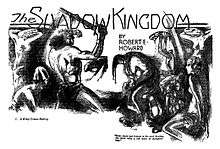The Shadow Kingdom
| "The Shadow Kingdom" | |
|---|---|
 | |
| Author | Robert E. Howard |
| Country | United States |
| Language | English |
| Series | Kull |
| Genre(s) | Sword and sorcery |
| Published in | Weird Tales |
| Publication date | August 1929 |
| Followed by | "The Mirrors of Tuzun Thune" |
"The Shadow Kingdom" by Robert E. Howard is the first of Howard's Kull stories, set in his fictional Thurian Age. It was first published in the pulp magazine Weird Tales in August 1929.
The story introduces Kull himself, the setting of Valusia, the supporting character Brule the Spear-slayer and the Serpent Men (who do not appear in any other work by Howard but were adopted by later authors for derivative works and inclusion in the Cthulhu Mythos).
Plot
The story starts shortly after the Atlantean barbarian Kull has conquered Valusia and become its King. Kull is invited to a feast by the Pictish ambassador to Valusia, Ka-nu the Ancient. Despite the fact that the Picts are the ancient enemies of the Atlanteans, Ka-nu confides in Kull and tells him to expect the arrival of Brule the Spear-slayer later.
In the early night, Brule climbs into Kull's bed chamber, identifying himself with a "bracelet of gold representing a winged dragon coiled thrice, with three horns of ruby on the head" that had been shown to Kull at the feast. Brule explains that Kull's life is in danger and shows him secret passages that riddle the palace. Through these Kull sees that the guards outside his room are all dead and their bodies hidden, although they still seem to be on guard at the same time. A visit by Chief Councillor Tu, with exposition from Brule, reveals the truth as Tu attempts to assassinate the sleeping King but meets him awake and armed; it was, however, not the real Tu but a snake man who had taken his form.
Brule reveals that the Serpent Men, an ancient pre-human race that had built Valusia but was almost extinct, ruled from the shadows, using their Snake Cult religion and ability to disguise themselves with magic. They intended to replace Kull with a disguised Serpent Man, just as they had done with his predecessors.
The next day, the Serpent Men again attempt to replace Kull. He and Brule are, through illusion, tricked into a separate room instead of the real council, surrounded by Serpent Men disguised as the councillors. Kull realises the trap in time, however, and the two barely defeat their attackers. Heading to the real Council Room, they see another Kull. The fake Kull is killed by the real one, revealing the fake as a Serpent Man and so also revealing the truth of the existence of Serpent Men in general. The story ends with Kull's oath to hunt and destroy the Serpent Men for good.
Style
The subjects of masks and identity are repeated throughout the story. The most obvious instance of this is the Serpent Men's ability of disguise through magic and their use of this to steal identities at will.
Kull, as a barbarian, sees the diplomacy and politics of Valusia (and the others of the Seven Empires) as a form of illusion. Early in the story, before the Serpent Men appear, Kull's thoughts on the matter are described:
Strange to him were the intrigues of court and palace, army and people. All was like a masquerade, where men and women hid their real thoughts with a smooth mask.
Musing on his own identity later in the story, Kull extends the mask metaphor to himself:
Was it the real Kull who sat upon the throne or was it the real Kull who had scaled the hills of Atlantis, harried the far isles of the sunset, and laughed upon the green roaring tides of the Atlantean sea? How could a man be so many different men in a lifetime? For Kull knew that there were many Kulls and he wondered which was the real Kull. After all, the priests of the Serpent went a step further in their magic, for all men wore masks, and many a different mask with each different man or woman; and Kull wondered if a serpent did not lurk under every mask.
This is touched on again shortly afterwards when, on seeing a Serpent Man masquerading as himself, Kull is momentarily confused:
He stepped back, his mind reeling. "This is insanity!" he whispered. "Am I Kull? Do I stand here or is that Kull yonder in very truth, and am I but a shadow, a figment of thought?"
Adaptions
The story was adapted two times in comic books:
- Kull the Conqueror #2, September 1971 (Marvel Comics). Written by Roy Thomas, penciled by Marie Severin, inked by John Severin.
- Kull #2, December 2008 (Dark Horse Comics). Written by Arvid Nelson, art by Will Conrad
External links
| Wikisource has original text related to this article: |